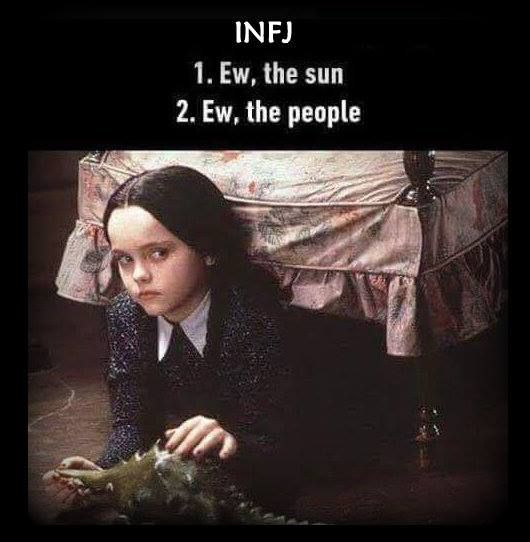ButterflyChaser
Newbie
- MBTI
- INFJ (t)(p)?
- Enneagram
- 4w5
I'm an INFP and I don't really procrastinate all that much. When it comes to something I need to do, I do it right away so that I have more time to lay around be lazy and play games.I hate it that people associate P with procrastination! LOL Anyhoo, I like the 16 personalities, it was the most accurate for me. I've only been typed as an INFJ a handful of times vs the billions of times typed as an INFP and I've studied up on the functions so I'm pretty confident in my type. I think it's also pretty common for an INFJ to mistype as an INTJ because of that Ni dom and also because INFJ's tend to have an equal use of and appreciation for both the rational/logic side and the emotional/artsy-fartsy side. One of my favorite INFJ's who is also on this forum often types as INTJ, which just makes me lol because she's definitely NiFe. Though I don't see a ton of Fe from you, I haven't read a ton of your posts either. I do get a Ni vibe though! But what really matters is how YOU feel about it and what YOU identify with more. Let us know!
Yeah I've wondered about it too. I'm close enough to nearly always get INFP/ INTP as my results, but when I read through the function stacks I'm a bit of a contradiction. I relate more with Ni than Ne. Figured out Fe / Fi is certainly not first in my function stack. If it were I'd be a lot quicker to recognise my emotions. I tend to disassociate from them and focus on the thought stream, except in times of stress.
I likely can do Fi, but it seems if I dwell on it for too long, it drains me. I end up feeling moody, depressed, unstable, worried about unpleasant emotions, did what I say end up upsetting x, and then second guessing myself. It is not a happy place for me to be. A tiny bit of it can be energizing, inspire self awareness, but after that, it is like eating too rich a desert. I get stomach pains/ start vomiting pain/ grow too needy and lean on people too much/needing therapy and start considering the need for antidepressants. I'm guessing an INFP has better control of this, can indulge in this area without it turning into an issue.
But if I use Fe: Step out a bit more and see how I am feeling as part of a broader scope, and observe the emotions of other people, it seems my mood stays more stable. Not to say I can't get caught up worrying about disrupting harmony and that, but I am less focused on my self and overall can take things much better. I'm not as sensitive, and I can think clearly, and not have so much emotional clutter to sort through.
At least that's what I've been observing so far for quite a while. I'm still not fully sure if I got this right. I kind of see it not unlike going through a field trying to identify animals, plants and stuff with just a narrow little book explaining just the basics and painted representations of each thing. That said thoughts and emotions are far more complex than a little description can provide.

